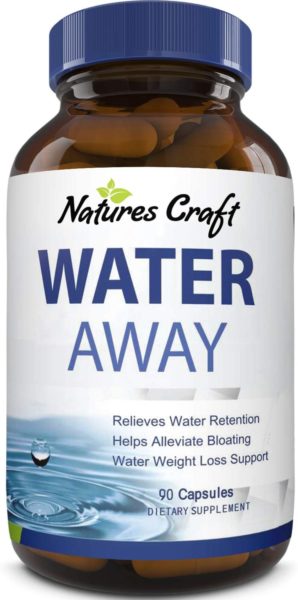Diuretics are supplements that reduce the amount of water weight that your body is carrying.
Though generally discarded as a reliable solution for long-term weight loss, diuretics are popular among bodybuilders, wrestlers, fighters, and other athletes that need to make weight.
Diuretics are also used by people who are on detox diets or detox supplementation regimens, with the goal being to “shed” toxins through water loss. Do diuretics work, and which types are the best?
Our research team sought to answer both of these questions with our rankings of the ten best diuretic supplements on the market and our review of the science behind diuretic supplements.
Research
Rankings
1. Phytoral Water Away
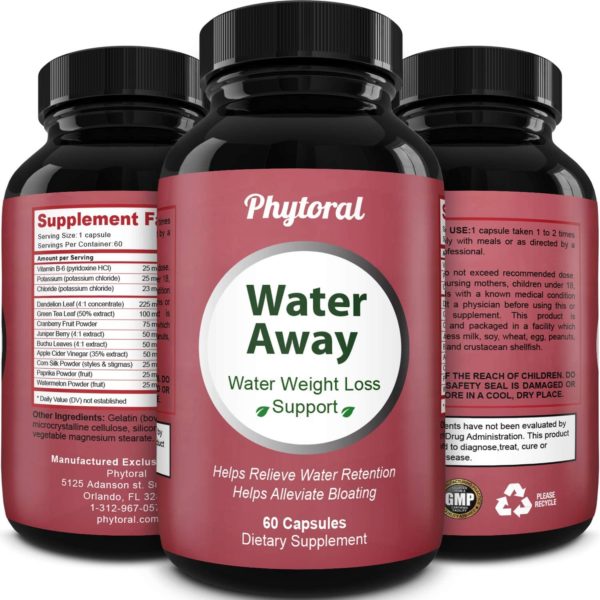
Phytoral Water Away uses a blend of concentrated electrolytes, dandelion leaf, green tea extract, and powdered extracts of various fruits and herbs to increase water loss.
This multi-ingredient supplement has broad approval among users for its ability to fight excess water retention by gradually reducing the amount of water your body carries around.
Its wide success and range of ingredients make it our top pick.
2. Zhou Water Away
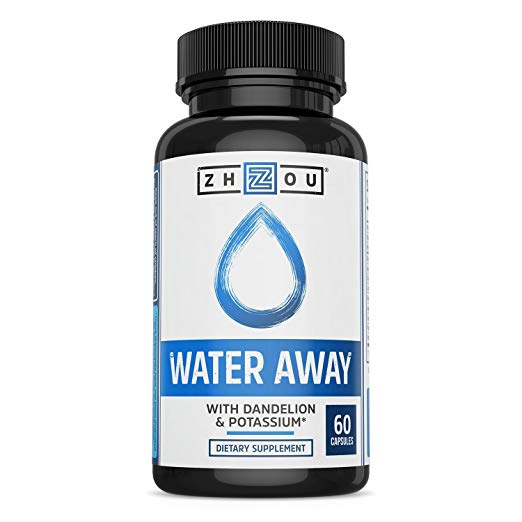
Zhou Water Away is one of the best supplements that is focused mostly on natural and herbal ingredients for reducing water retention.
It’s got a wide range of herbal ingredients, like cranberry, juniper, buchu leaf, and apple cider vinegar, but the primary focus is on dandelion leaf extract and green tea extract.
These are both delivered at higher doses than you’ll find in many competitors, so Zhou Water Away is likely to be a very solid choice.
3. Nature’s Way Dandelion Root
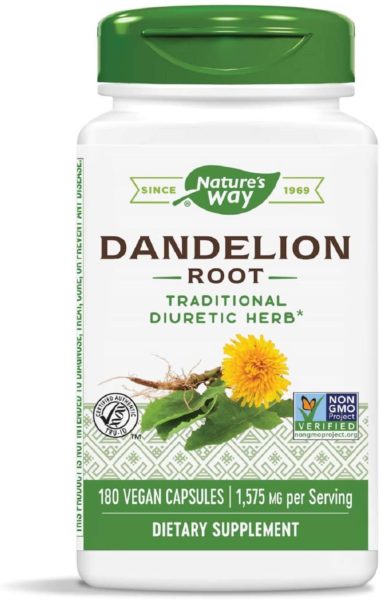
Nature’s Way Dandelion Root stands out for its concentrated focus on a single ingredient, dandelion root extract. Each capsule delivers just over 500 mg of raw dandelion root, and the only other ingredients in the supplement are cellulose and magnesium stearate for keeping the capsule together.
If you want to keep things simple and use the fewest ingredients as possible to control your water levels, Nature’s Way Dandelion Root is a great product to try.
4. Diurex Max
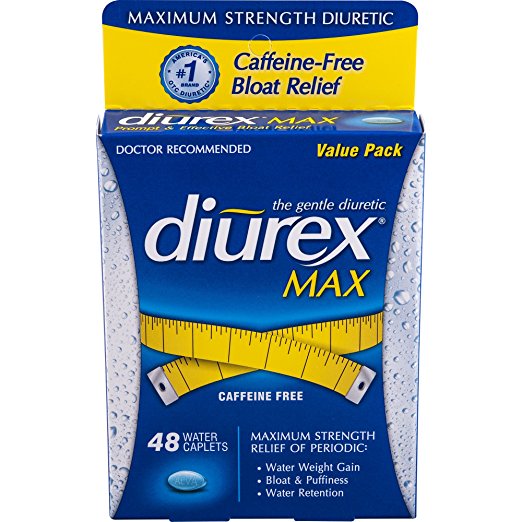
Diurex Max is a pharmacological solution to bloating and excessive water retention. This supplement delivers a 50 mg dose of pamabrom, a chemical compound that’s a reliable way to get your body to shed excess water.
While those looking for an all-natural solution might prefer something plant-derived, it’s hard to beat when it comes to efficacy.
The other drawback is the presence of a lot of binders and artificial coloring agents like Blue #1 Lake, mineral oil, and even sodium lauryl sulfate. Though effective, it would be better if Diurex was designed cleaner.
5. Huntington Labs Water Away
If you want a diuretic that focuses on herbal sources for eliminating excess water, Huntington Labs Water Away should be your choice.
Instead of loading up on electrolytes, this diuretic uses natural sources like dandelion, green tea, cranberry, and juniper to create water loss.
It’s an effective and all-natural way to increase your body’s water elimination rate, and while there’s definitely value in alternative approaches that are electrolyte-based, Water Away is worth a shot if herbal-based remedies are what’s important to you.
6. Now Water Out
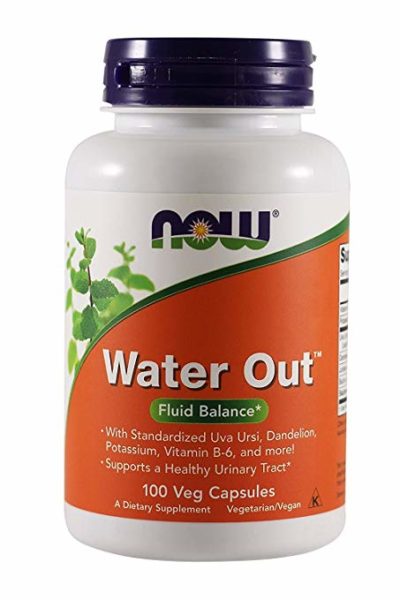
Now Water Out is unique in its approach; its formulation is based on a high dose of uva ursi extract in combination with dandelion, and it lacks many of the other herbal ingredients you’ll find in other diuretic supplements.
It’s worth a try if you are not finding success with other diuretic supplements, since this alternative formulation might work better for your body.
7. MHP Xpel
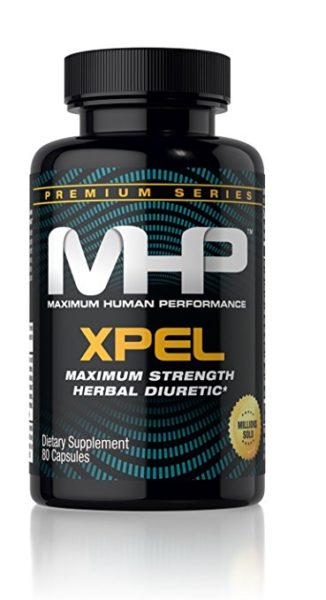
MHP Xpel is mostly focused on reducing water retention by delivering a high dose of electrolytes, along with caffeine from green tea and guarana.
There’s also a proprietary blend of herbs, like juniper, dandelion, and horsetail, but most of the efficacy in this supplement comes in the electrolytes and caffeine.
It’s reasonably effective on this front, though the caffeine will prevent you from being able to use it later in the day if you are sensitive to the stimulant effects of caffeine.
8. SteelFit Hydra Steel
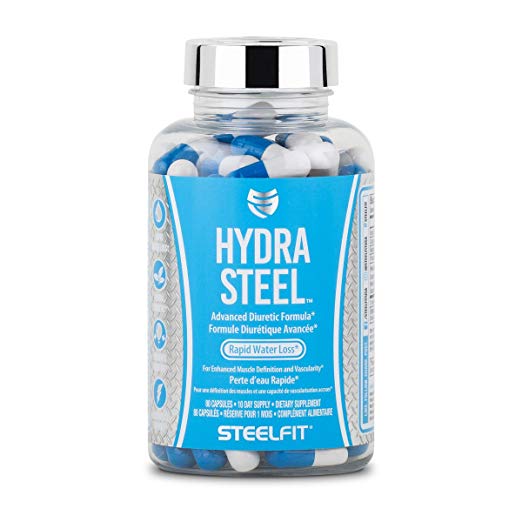
SteelFit Hydra Steel has a few unique ingredients you won’t find in other diuretic supplements like uva ursi extract and nettle leaf extract.
This might boost the efficacy for people who are not having success with other products. However, the downside is that Hydra Steel has a high caffeine content, which makes this a non-starter for people trying to decrease water retention in the evening or who are sensitive to caffeine.
9. Bio Sense Water Away
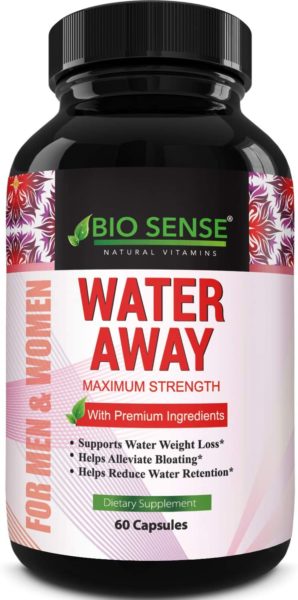
Bio Sense Water Away has a formulation that’s pretty typical of diuretic supplements that focus on herbal ingredients.
It has all the usual components, like dandelion, green tea, and watermelon extract, but not much really stands out about this diuretic.
There are a few binders and additives in the capsules that will be a turn-off for some purists, though that aside, the formulation of this diuretic isn’t much different than your other options.
10. Nature Bound Water Away
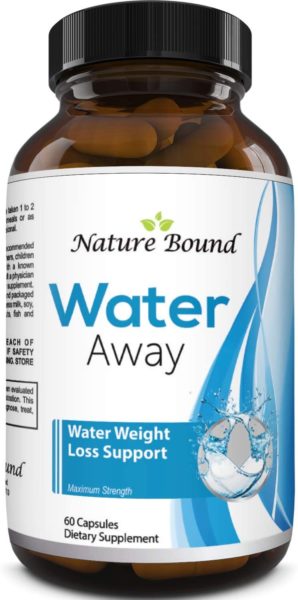
Nature Bound makes a diuretic that uses all-natural ingredients, but even though the ingredients are pretty solid, it’s less likely to be effective compared to many of its competitors.
That’s because the doses of many of the key components of this supplement, like dandelion, green tea, cranberry, and juniper, aren’t as strong as the doses in some other competitors.
If you want a lower-dose diuretic, though, this might be a decent option.
Category winners
Best diuretic overall: Phytoral Water Away
For a versatile diuretic that combines herbal extracts with electrolytes, Phytoral Water Away is a reliable choice. Its diverse range of ingredients and its clean supplement design make it our top overall recommendation.
Best diuretic for rapid weight loss: Diurex Max
To shed as much water weight as quickly as possible, Diurex Max is the way to go. It may not be the purest, and it doesn’t rely on all-natural compounds, but it can do the trick when it comes to rapid weight loss.
Best diuretic for making weight for a competition: Zhou Water Away
For wrestling, boxing, MMA, powerlifting, and other weight class-based competitions, you want a powerful diuretic with proven ingredients. Zhou Water Away fits the bill, combining vitamin B6, electrolytes, dandelion, green tea extract, and more to drive out excess water.
Best diuretic for women: Phytoral Water Away
For hormonal reasons, women seem to be more prone to bloating and water retention. Phytoral Water Away is a great pick for them, thanks to its combination of dandelion, electrolytes, and green tea extract to expel water from the body.
Best diuretic for bodybuilders: Zhou Water Away
For shedding excess water during a cut, you want a potent and effective diuretic. Our pick on this front is Zhou Water Away, which employs dandelion and green tea extracts at significantly higher doses than the competition.
Best diuretic for bloating: Nature’s Way Dandelion Root
If excess water retention is leaving you feeling bloated and sluggish, we recommend Nature’s Way Dandelion Root. Its moderate dosage and no-nonsense, dandelion-focused formulation makes it a reliable supplement for consistently keeping water retention down throughout the day.
Who should buy diuretics?
Diuretics are great for most people and help to get rid of excess water and sodium in the body. Diuretics can help athletes make weight, as well as help, manage bloating, and excess water retention.
Diuretics should not be consumed by children or pregnant women unless otherwise directed by a medical professional.
How we ranked
There are a variety of natural diuretic supplements on the market, each with their own strengths. Dandelion root, hawthorn, and parsley are scientifically proven to enhance kidney function and increase urine output, which is why you’ll find them in all the diuretic products on our list, including Zhou and Huntington Labs.
Green and black tea are also naturally proven due to their caffeine content to help remove excess fluid. However, we did prefer products like Nature’s Way, which was lower in caffeine content – due to the negative side effects too much caffeine can cause.
We decided to included Diurex in our top 5 because of its efficacy but refused to rank it higher since it was not a natural product and can interfere with medications. They also included a lot of binders and artificial coloring agents like Blue #1 Lake, mineral oil, and even sodium lauryl sulfate, which was a big no-no for us.
Many diuretics will get rid of a ton of electrolytes as a side effect, which can cause major issues if left unchecked. Our top choice, Tevare, not only provided scientifically proven diuretic ingredients but also included electrolytes to replace the ones that might get removed during urination.
Benefits
Diuretics encourage your body to retain less water. There are a variety of pathways that this can be accomplished, and different diuretic supplements take advantage of each of these, but the ultimate goal is always the same: lose more water.
While “water pills” enjoyed a brief heyday as a popular weight loss supplement, people eventually realized that they did not create sustainable weight loss.
That doesn’t mean that diuretics don’t have a place in supplementation, though.
They’re quite popular for people doing a detox or a cleanse, and people with conditions that cause excess water retention report finding diuretic supplements invaluable for keeping off excess water.
The diuretic effect of caffeine is fairly small. Though many diuretic supplements include small to moderate amounts of caffeine, top-quality diuretics aren’t solely based around this ingredient, as research shows that the diuretic effect of caffeine is not very large.
That was the conclusion of a scientific review in the Journal of Human Nutrition and Dietetics by researchers at Loughborough University in the United Kingdom (1).
The scientific review looked at a wide range of studies on the diuretic effects of caffeine. The authors concluded that, while moderate to high doses of caffeine did have a diuretic effect, people quickly became adapted to the effect.
Within a few days of taking a caffeine-containing supplement, there is a dramatic decrease in the diuretic effect of the caffeine.
While this is good news if you are taking something like a pre-workout supplement that contains caffeine, it does mean that a simple caffeine pill is not going to be an effective way, by itself, to achieve consistent water retention control.
Green tea extract may exert a stronger diuretic influence than caffeine. Though we’ve just seen that caffeine itself does not have a particularly strong diuretic effect, some evidence suggests that when it is delivered alongside the other biologically active compounds in green tea extract, the strength of the diuretic effects may be amplified.
This is according to a review article authored by researchers at the University of Granada in Spain and published in the Journal of the American College of Nutrition (2).
The review cited research showing that other compounds in green tea, such as theophylline, augment and amplify the diuretic effects of caffeine.
This is why you’ll find green tea extract in many of the top-ranked diuretic supplements on the market.
Supplements that contain dandelion can cause a diuretic effect by increasing urine output. Dandelion—specifically the extract of dandelion root—is one herbal extract that’s been studied for its ability to create a diuretic effect.
One scientific study published in 2009 in the Journal of Alternative and Complementary Medicine explored the effect of a dandelion extract in human subjects (3).
The study involved 17 subjects taking a dandelion extract supplement after an initial two day “run in” period to establish the typical water output of the subjects, as measured by 24 hour urine production.
Then, the subjects took two doses of dandelion extract during a 24 hour period and the researchers continued to measure their urine output. They found that taking the dandelion extract was associated with a significant decrease in urine production compared to each subject’s baseline values.
While this study did not have the advantage of a control group, it does show that even a single ingredient like dandelion root shows substantial promise as a means to increasing water output and thereby decreasing water retention.
Potassium can act as a diuretic. Though potassium is a simple and common electrolyte, at low doses it can act as an effective diuretic.
In fact, potassium administration is often used in medical settings to control water content among people with kidney problems (your kidneys being the organ that typically regulates your body water retention).
Though the dose of potassium in a supplement is strongly limited by regulations on the potassium content, scientific research still suggests that including a small amount of potassium in a diuretic supplement could be effective.
According to a scientific article published in 1998 in the American Journal of Kidney Disease, restricting potassium intake causes an increase in water retention, while administering potassium causes an increase in water loss through greater urine production (4).
This increase in urine production and water loss does come at a cost: higher potassium levels can be related to increased retention of sodium and an increase in blood pressure.
This suggests that diuretic supplements that contain potassium could be more effective, though if high sodium or high blood pressure is a concern for you, it may be better to avoid taking a diuretic supplement that contains potassium.
Side effects
Since diuretics are modulating one of the key properties of your body (its water content), they have a lengthier list of potential side effects than many other supplements.
According to the Mayo Clinic, the water-modulating effects of diuretics can cause swings in your blood levels of the electrolytes sodium and potassium (5).
They may also modulate your blood pressure and cause you to get dizzy or get headaches. One very predictable potential side effect of diuretics is dehydration: if you are losing more water than you are taking in, the inevitable effect is going to be dehydration.
People who should not take diuretic supplements without talking to their doctor include people with blood pressure problems and people with kidney problems, as they are particularly vulnerable to the side effects of diuretics.
Recommended dose
Many of the ingredients in diuretics have only been studied recently or in passing for use as diuretics, so specific doses are hard to establish.
In the case of dandelion root, the typical doses that are studied in the literature can be quite high: up to 8 grams per day. Human research on the diuretic effects of dandelion root is fairly new, so the minimum effective dose may not be this high (indeed, most supplements have doses far lower than this).
Potassium doses are limited to 100 mg per capsule by federal regulations, as excessive potassium supplementation can have severe side effects.
Green tea extract can be used at dosage ranges anywhere from 100 to 200 mg, though these are based on general studies on health, not diuretic effects specifically.
FAQ
What are the three types of diuretics? Though all diuretics result in increased urine output and reduced welterweight within the body, they are all prescribed for different subpopulations. Loop diuretics are most often used to treat heart failure. Potassium-sparing diuretics are used to reduce the amount of fluid within the body without risking the potassium levels within the body. These are usually prescribed in addition to blood pressure medication. Thiazide is another popular diuretic, typically used as a treatment method for high blood pressure.
Do diuretics make you pee? The primary function of diuretics is increasing the need to urinate by producing greater urine output. When the body retains water, there is also higher retention of sodium.
With the use of diuretics, the body begins to excrete large amounts of water, which, in turn, also reduces the sodium within the body. With that said, diuretics do not just rid you of water weight, but also of excess sodium inside the body.
Because of the effects that diuretics have on the body, you should expect to urinate much more frequently when taking your diuretics.
Are diuretics bad for kidneys? Unfortunately, diuretics may negatively affect your kidneys and their functioning. Generally speaking, if you are taking diuretics as prescribed and not for an extended period of time, you should not experience any negative impact on your kidneys.
When taken in excess and for long periods of time, your kidneys may become inflamed or swollen. With that said, you should be getting your kidney functioning tested by a doctor or medical professional on a consistent basis when taking diuretics.
Will diuretics dehydrate you? Because diuretics cause you to urinate more frequently and in larger amounts throughout the day, you will be reducing the amount of water retained in your body. In doing so, it is possible that your body will rid itself of too much fluid and cause some of the adverse side effects of dehydration.
When diuretics cause symptoms of dehydration, you may experience dizziness, increased thirst, muscle cramping, and headache. To help prevent dehydration as a result of taking diuretics, you should attempt to maintain your water intake throughout the day to minimize symptoms. If dehydration persists, you should discuss this with your doctor or visit the hospital if the condition appears serious.
Do diuretics help you lose weight? Due to the fact that diuretics cause an increase in urine output, you may experience weight loss in the form of water weight. Though you’ll notice that the number on the scale is decreasing and you may appear slimmer (after long-term use), the weight that is lost is purely in retained water and not in fat.
In fact, there have been many documented cases in which athletes began using diuretics as a method of losing weight. During these instances, these athletes were attempting to reduce their weight quickly in order to participate in a sport that involved staying within a weight class (i.e., martial arts, wrestling, weightlifting).
After widespread diuretic abuse by athletes, major organizations began adding diuretics to the banned substances list (6).
Are diuretics safe for weight loss? Just because there is a connection between diuretic use and weight loss does not mean you should use diuretics to lose weight. While you might appreciate seeing a lower number on the scale when weighing yourself, there are potentially significant risks associated with the abuse of diuretics.
Diuretics are not prescribed for the purpose of weight loss because of the significant negative effects they can have on the body.
Are diuretics dangerous? For the most part, diuretics are healthy and promote positive responses within the body. However, there are many side effects associated with diuretics that may be as a result of lost water weight and increased urination.
Since diuretics cause water loss, which rids the body of excess sodium, there is a small possibility that diuretics can significantly reduce the amount of potassium and sodium in the blood – which could significantly affect the functioning of your heart and muscles.
With a reduction in water weight and a resulting increased urine output, you may experience an increase in blood sugar, muscle cramps, increased cholesterol, thirst, and other unfavorable side effects.
Though these may seem relatively mild, there is a chance that these side effects can be the result of excessive loss of nutrients through urination, and long-term, these side effects can be damaging. As long as you are maintaining consistent contact with your doctor and consistently monitoring the functioning of your kidneys and nutrients within your blood, diuretics should be safe.
What is a diuretic? A diuretic is any substance that causes an increase in urine output and an overall reduction in water weight within the body. Though the average person thinks of diuretic medications, there are also many foods and beverages that cause a diuretic effect in humans. In terms of medications, there are three types of diuretics: Loop, Potassium-Sparing, Thiazide.
What is the difference between laxatives and diuretics? Laxatives and diuretics are very similar but target different bodily functions. Diuretics increase the need to urinate and help rid the body of excess water and sodium.
Laxatives also increase output from the body, but in the form of defecation (stool). The primary function of laxatives is to soften the stool within the body, which results in easier or quicker defecation. Laxatives and diuretics are both found naturally in foods and beverages.
Are water pills considered a diuretic? Diuretics are commonly referred to as “water pills.” The term “water pills” refers to the effect that diuretics have on the body, particularly the reduction of water weight and water in general (urination).
Why do people with high blood pressure take diuretics? When salt is consumed in excess, the body stores it with excess water. With the excess water and sodium in the body, the heart has to work harder in order to maintain bodily functions and reach all areas of the body.
When a diuretic is taken, it reduces the amount of fluid in the body and also rids the body of excess sodium (among other substances). When that occurs, the body has to support less weight and therefore has a lower sodium level.
Which diuretics are commonly used to treat high blood pressure? Thiazide diuretics are the type of diuretics commonly used to treat high blood pressure. If using potassium-sparing diuretics, your doctor will likely need to combine this medication with a blood pressure medication in order to lower your blood pressure (7).
What are the best diuretic foods? Some foods that could produce a diuretic effect when consumed include asparagus, celery, dandelion, cranberries, and watermelon.
What are the best diuretic drinks? Diuretic drinks are much more common than diuretic foods, and there is a good chance that you don’t even realize that what you’re consuming is a diuretic. Two of the more common beverages that produce a diuretic effect are coffee and tea.
The most common reason that coffee and teas are considered diuretics is because of their caffeine content, which increases your urine output.
Are caffeine pills diuretics? It would be inaccurate to state that caffeine pills are diuretics, but there is a high probability that you’ll experience a diuretic effect when consuming caffeine or caffeine pills in large amounts.
What are the dangers of taking diuretics? The dangers of diuretics vary greatly depending on your health conditions, the diuretic prescribed to you, and how much you are taking. Generally speaking, diuretics are safe if you have no other pre-existing conditions, and you are frequently monitored by your doctor.
Some of the more common side effects of diuretics are dehydration, dizziness, headache, and increased thirst. However, there is a possibility of developing hypokalemia or hyponatremia when taking diuretics, which could produce more significant health concerns.
Hypokalemia is a state in which your blood has low levels of potassium. When your body experiences this condition, there is a likelihood that your symptoms will include fatigue, muscle cramping, and affected heart functioning.
Left untreated, this condition is severe and could prove fatal. Hyponatremia is a condition in which your body has low levels of sodium. Like hypokalemia, this condition can cause headaches, fatigue, and muscle cramping. In addition, this condition can lead to seizures and coma, which present an extreme health risk.
Diuretics are also potentially dangerous for diabetics, as the substances are known to affect insulin and glucose levels within the body. With that said, you should avoid purchasing over-the-counter diuretics if you are diabetic (8).
Why do diuretics cause hypokalemia? Hypokalemia is a condition that involves low potassium levels within the blood. When diuretics are taken, a large amount of water is excreted from the body in the form of urine.
In the process of this urination, greater amounts of sodium are also removed from the body. In addition, there is a possibility that potassium will be removed during urination, which could have significant effects on the body and its functioning.
If diuretics cause a notable loss of potassium in the body, there are some severe effects that may result, such as weakness, fatigue, affected heart functioning, and muscular issues.
With that said, if you’re taking a diuretic (that is not a potassium-sparing diuretic) and experience any of these side effects, it’s possible that you are suffering from hypokalemia.
How can you prevent hypokalemia? One of the major ways of preventing hypokalemia is through prescribing potassium-sparing diuretics. Through this type of diuretic, less potassium is lost through the urine, and the body is able to maintain appropriate potassium levels and function properly.
Where can you buy diuretics? Generally, your doctor will be the one prescribing you diuretics for your condition. However, diuretics are also sold over-the-counter at major pharmacies and health and wellness stores. While the availability of diuretics makes it possible for almost anybody to use them, you should consider consulting your doctor before beginning to use them.
Related Articles
Recap
A diuretic supplement can help your body lose more water and retain less. Mostly, diuretic supplements accomplish this by increasing urine output.
If you have bloating, swelling, or other signs of excessive water retention, you might benefit from a diuretic supplement.
Some key ingredients to look for are dandelion root, green tea extract, and for some people, potassium. Since a diuretic is manipulating an important part of your body’s self-regulation, they do have more potential side effects.
These include electrolyte problems, blood pressure changes, dizziness, and headaches. Despite this, for some people, diuretics are a way to achieve less bloating, less swelling, and better wellness by cutting down on excessive water retention.
For Body Nutrition’s #1 diuretic recommendation, click here.
